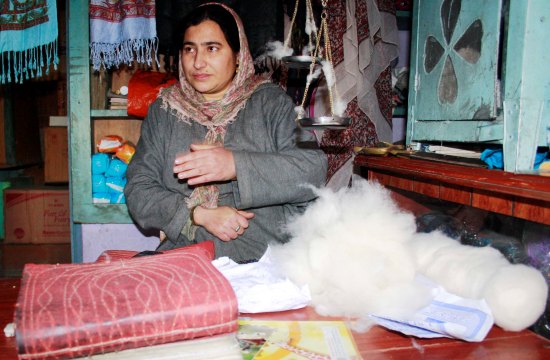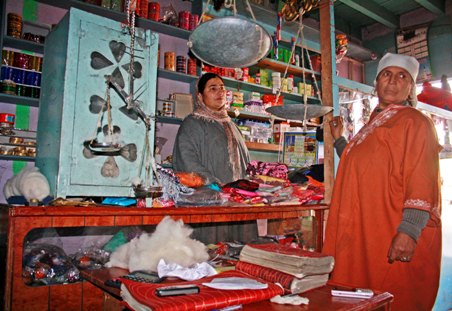When circumstance left her husband incapacitated, Shamima turned to Pashmina weaving, and went on to set up an enterprise that helps thousands of women earn a living. SHAZIA YOUSUF reports.

Shamima makes some quick calculations. Just a few pencil screeches on the notepad, and she takes out money to pay her workers. While the women take the wages, Shamima attends a call – from a dry fruit dealer. She cuts the conversation short to attend customers in her shop. As she is busy with them, she hears someone calling her. It is her husband from kitchen. Shamima rushes out.
The 40 year old woman from Awantipora, Kashmir may seem in a hurry, but it is just a routine day for her. For hundreds of her women workers Shamima is more than an employer: She is a mentor, and an inspiration.
Nineteen years ago, Shamima was a content housewife living happily with her husband Nazir Ahmad Wani, a bus driver. A tragedy left Wani incapacitated and forced Shamima to come out of her kitchen.
From running the kitchen, Shamima went on to establish an enterprise which helps more than 2000 women earn a living, “I earn 30,000 per month and the women who work under me earn 3000-6000 rupees each,” Shamima says.
Shamima say she was destined to go against the tide since her childhood. In a large joint family, she was the only girl among 12 cousins to go to school, and became the first matriculate girl in her village Chursoo.
She had to cut short her studies for marriage. In 1990 she got married to Nazir, who came from a rich family and lived with his four elder siblings in their father’s house. “Nazir was 6 years older to me and a loving husband. He would earn around 20,000 from his bus, we were happy till I went to my fathers home in 1992, to give birth to my first child.”
On her return, Shamia says she found a different situation. Nazir’s bus had been sold off by his brothers, and they had distributed their whole property among themselves, excluding Nazir.
“Nazir was youngest, and raised by his relatives. They didn’t give him anything in the property except a small house as shelter,” says Shamima.
Shocked, Nazir fell into severe depression and suffered a nuerological problem that damaged his right ear and left him incapacitated. Suddenly Shamima found herself alone, with a newborn daughter and ailing husband to feed. “I sold jewellery, sent him to Delhi with my brother for treatment and turned to Pashmina spinning,”
When Nazir returned after many months he had almost succumbed to his luck. He offered Shamima divorce to let her start a new life. “He said, I was free, can leave and take whatever was left in our possession,” recalls Shamima. Her father also backed the proposal.
“He (Nazir) looked lonely, I asked him what will he do when I leave. He looked at me but said nothing…he wanted me to stay,” Shamima recalls.

She stayed and ran the family on the little money she would earn from spinning Pashmina for fifteen hours a day. Things took a turn in 1996 when she asked her brother to buy her a sack of Pashmina from Leh. “I had saved some money so I asked him to buy pashmina. A 2kg bag would cost Rs 800 there, and Rs 4,000 here,” Shamima explains. “But when he bought it, I didn’t know what to do with it as spinning it would be a lifetime job. Then I thought of hiring women.”
She converted a small store room into a shop. Soon women from adjacent villages joined the Wani Pashmina Katayee Centre. Another room was converted into a workshop. Soon she found reason to add more things – ladies products.
“In a cosmetic shop once, I saw a teenage girl asking for some ladies items to a salesman. He was embarrassing her by unnecessary questions. Her blushed face haunted me for days.”
Now women flock to her shop everyday to make such purchases.
Later she added almonds to her store. She distributes almonds among women for taking out kernels. With business expanding, Shamima appointed women agents in each village to manage the rush. “It generated employment for around a dozen women,” The agents collect the Pashmina yarn spun by women for her.
She is also planning to set up a shawl factory, where she hopes to end exploitation of women in the trade. She says most of the Pashmina used in shawls nowadays is spun on machine that saves manufacturers time and money but threatens livelihood of thousands of women. “I want to provide security to such women. When it comes to profit, traders have fixed 15 percent for women and 25 percent for men. I want to end the discrimination,” says Shamima.
With Shamima busy in enterprise, Nazir manages to take care of the household chores and their two children. He also looks after some money transactions in business. “I don’t want to shake his dignity by dealing with money, he should not feel inferior, it is he who is head of the family, I just earn it,” she says.
Overcoming the shock of her life, Shamima managed to do all a woman can dream of for her family – education of children, decent upbringing and a new house. Shamima is also learning computers these days. “I am planning to buy one for my shop,” she says.
















Hi THere,
I am from Australia and very interested in contact Shamima Wani. Is there any way that I can get in contact with her?
The Gov.t must come to the aid of such women provide loan on low intrest rate she is feeding not her own family but many other families too. A brave daughter of Kashmir